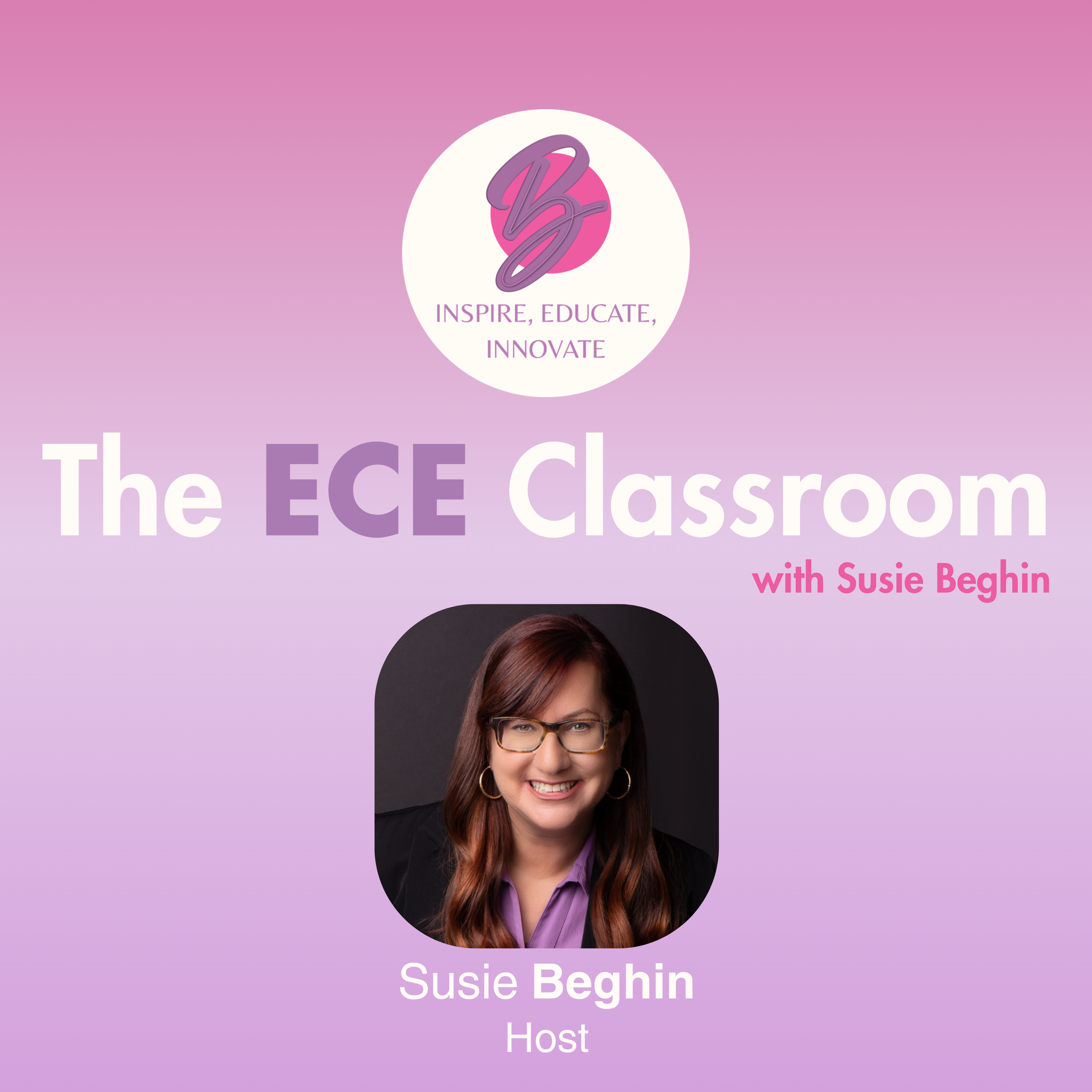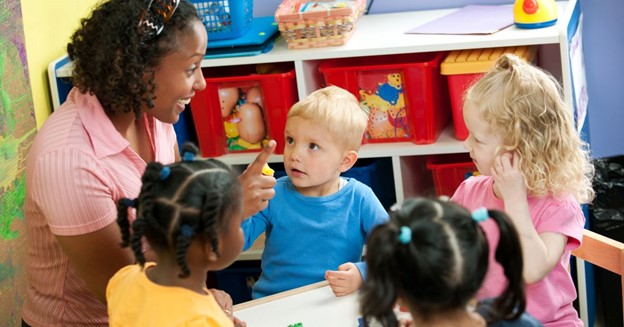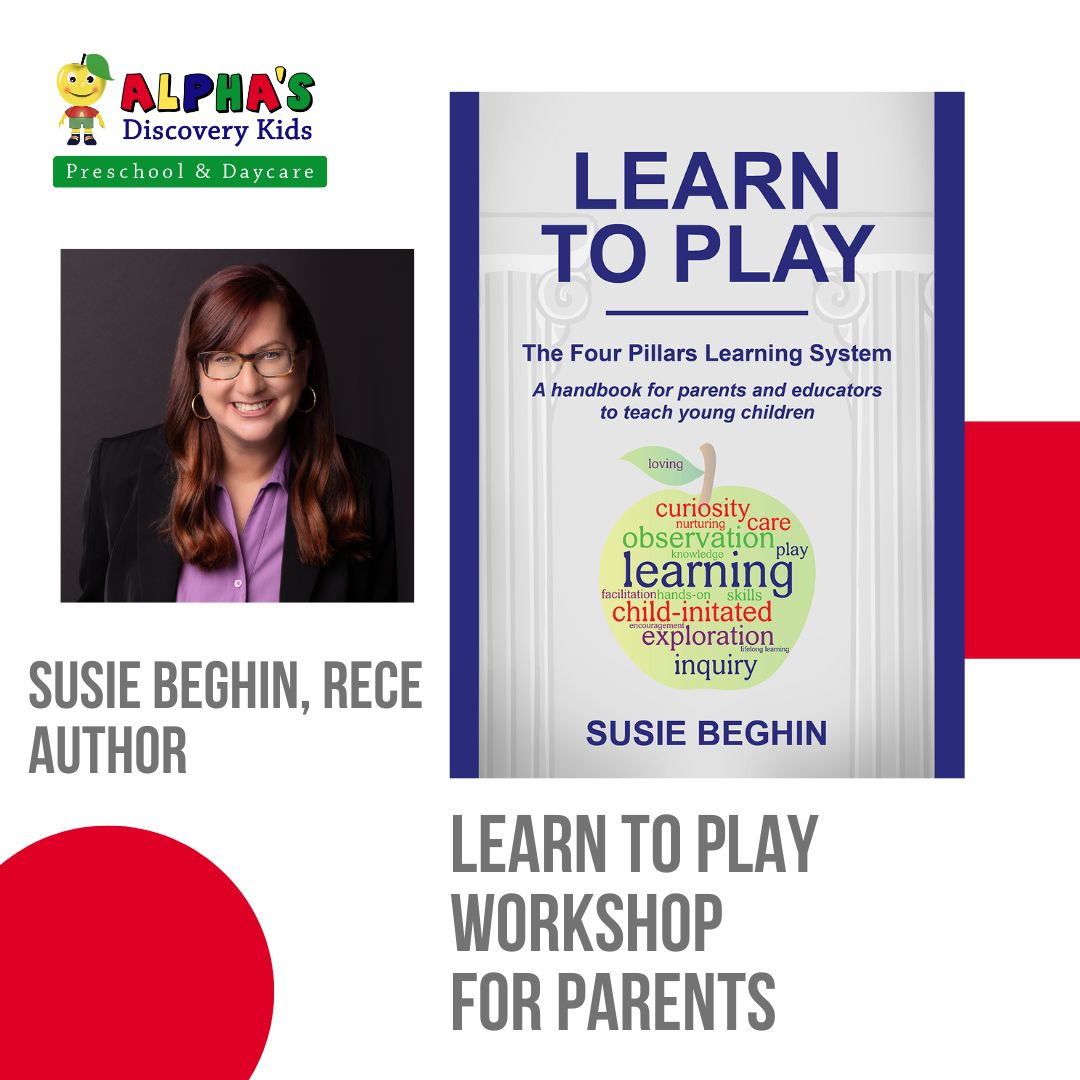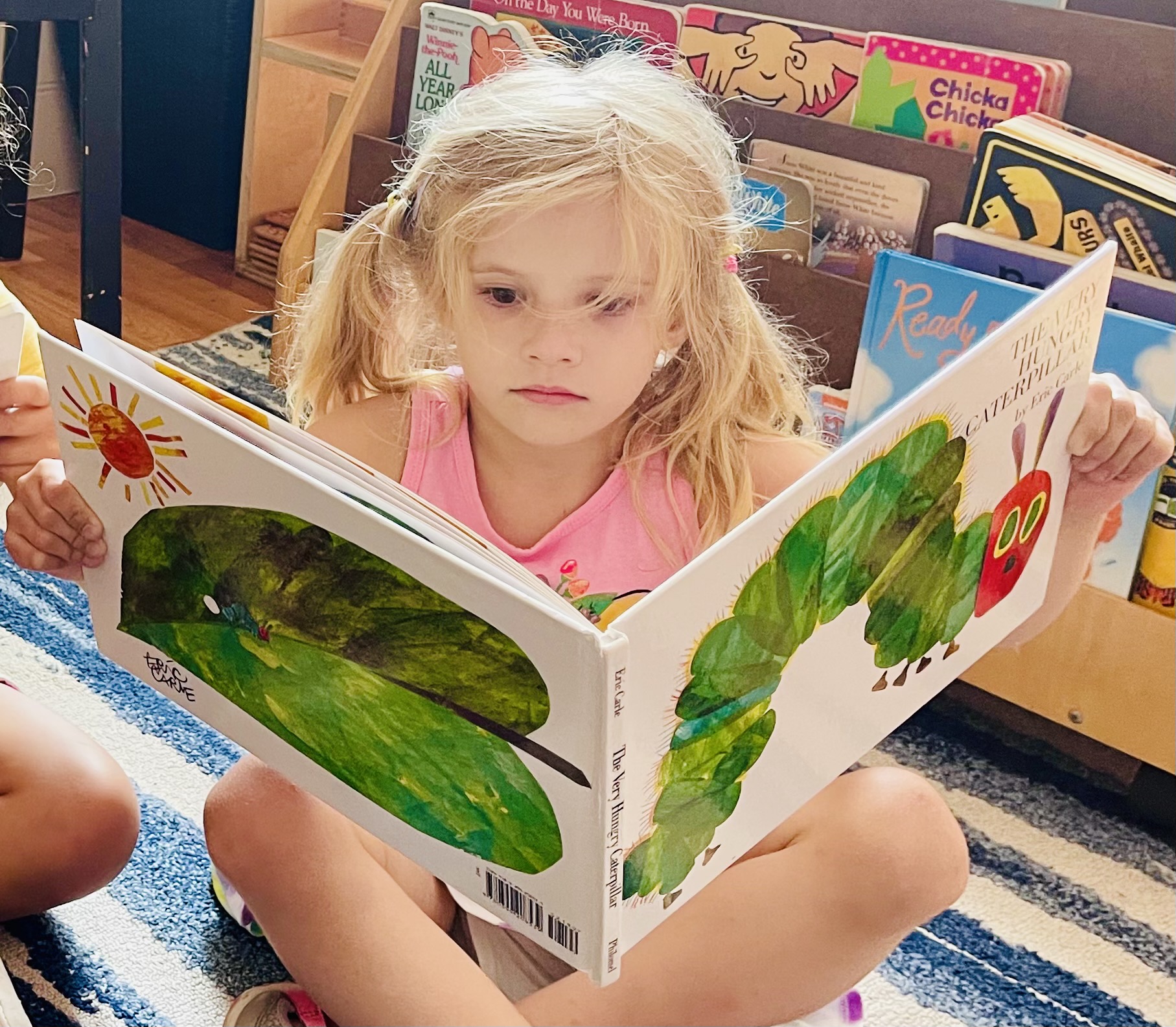The ECE Classroom – New Podcast for early childhood educators
The ECE Classroom with Susie Beghin
by Susie Beghin, RECE, Founder of Alpha’s Discovery Kids
“Educators are the lifeblood of the early child care system.” – Susie Beghin
I am thrilled and excited to announce the launch of my brand new podcast, ‘The ECE Classroom with Susie Beghin.’ Dedicated to exploring key topics in early childhood education, each episode offers insightful discussions and practical advice and is designed to inspire, inform, and empower educators, home care providers, and parents alike. With my background in early childhood education and daycare ownership, I am passionate about nurturing young minds and supporting those who work tirelessly to shape the future generation.
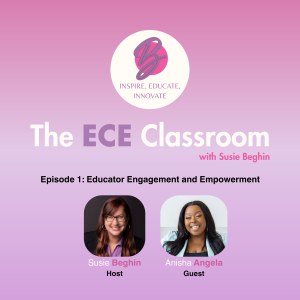
In our inaugural episode, I am delighted to welcome Anisha Angela as our guest speaker. Anisha is an Early Childhood Education (ECE) coach and expert with over 14+ years of experience in the field. Her extensive background includes leadership roles in childcare programs, teaching positions at college programs, and overseeing multiple childcare locations as a senior manager.
As the CEO and Founder of “The Early Childhood Coach + Co,” Anisha is committed to supporting the success of fellow ECE professionals through consulting, coaching, and training. With her wealth of knowledge and experience, Anisha shares invaluable insights into the current challenges facing educators, including burnout and stress, and offers practical tips for reigniting the spark within the classroom.
We hope you’ll join us on this journey of learning and growth as we strive to support and uplift the early childhood education community.
Listen to the podcast here: https://spotifyanchor-web.app.link/e/OPl10EGzNIb
Connect with Anisha on her social channels to stay updated on her insights and upcoming events:
Instagram: @anisha.theecc
Facebook: @AnishaAngella.co
Twitter: AnishaAngella.co (@AnishaAngella)
Youtube: Anisha Angella
Website: www.anishaangellabooks.ca
General Email: info@anishaangellabooks.ca
The Importance of Socialization for Young Children: Nurturing Minds and Hearts
The Importance of Socialization for Young Children: Nurturing Minds and Hearts
by Susie Beghin, RECE, Founder of Alpha’s Discovery Kids
At Alpha’s Discovery Kids, we are passionate about providing children with an environment where they can learn, grow, and thrive. And we deeply understand the paramount importance of socialization in a child’s early years. It’s not merely about play; it’s a foundational element of a child’s development that shapes their future in profound ways. We recognize that children are inherently social beings, wired to connect, learn, and grow through interaction with their peers and caregivers.
As a parent myself, I understand how crucial socialization is to nurturing empathy, honing communication skills and learning the art of human interaction. In the ever-evolving landscape of early childhood education, we understand that the first six years of a child’s life are the most formative. It’s during this period that a child’s brain is in a state of rapid development, absorbing knowledge, experiences, and social cues like a sponge. As Early Childhood Educators, we are not merely caretakers; we are shapers of young minds and hearts.
To us, socialization is not a byproduct of our curriculum but an integral part of it. Alpha’s Discovery Kids understands that every child is unique, and their social needs vary. Some children may thrive in a bustling social environment, while others may need more gradual and individualized socialization experiences. Our approach is flexible, recognizing and respecting these differences, allowing each child to bloom at their own pace.

The effects of COVID-19 on socialization
The COVID-19 pandemic presented unprecedented challenges for children’s socialization. Social distancing measures, mask mandates, and lockdowns disrupted the traditional avenues for social interaction. Many children missed out on the crucial social experiences that daycare and preschool settings offer. Here are some of the effects we observed during this challenging period:
- Insecure Attachment Issues: When young children are unable to establish secure attachments due to limited social interaction, it can have devastating consequences for their emotional well-being. Secure attachments form the basis of healthy relationships later in life.
- Excessive Crying: Inconsolable crying can be a sign of distress caused by a lack of socialization. Children need the comforting presence of caregivers and peers to feel safe and secure.
- Language Delays: Language development relies heavily on social interaction. With masks obscuring our facial expressions and limiting verbal communication, we noticed that language delays became more prevalent among young children.
The Importance of Early Socialization
The longer children are isolated from social experiences, the harder it can be to reintegrate them into social settings like daycare. A 3-year-old who has been isolated for an extended period may face more significant challenges than a 12-month-old in adjusting to group environments. Early socialization sets the stage for a child’s future interactions and relationships, making it a critical aspect of their development.

Three dedicated and happy young mothers sitting together on the floor, while watching their babies playing with safe multicolored toys at a modern playground for infants
Alpha’s Discovery Kids has observed significant advantages associated with socialization, and these benefits extend beyond full-time care. Even part-time attendance provides numerous advantages. Here are some of the benefits of socializing at daycare:
- Emotional Development: Children learn to identify and manage their emotions through interactions with peers and caregivers. They develop empathy, conflict resolution skills, and a sense of belonging.
- Cognitive Growth: Social play fosters cognitive development. Children engage in problem-solving, creativity, and critical thinking as they interact with others.
- Language Skills: Daily interactions with peers and teachers help improve language skills. Children learn to communicate effectively, expanding their vocabulary and language fluency.
- Independence: Socialization encourages independence. Children learn to make choices, solve problems, and take initiative in a supportive environment.
At Alpha’s Discovery Kids, every child in our care is treated as an extended part of our own families. We provide a nurturing and stimulating environment where socialization is a central focus. Our dedicated teachers, who are always patient, caring, and committed to making each child’s experience the best it can be, facilitate social interactions that promote growth and development.
We believe that socialization is not a luxury but a necessity for young children’s development. The pandemic underscored its significance, reminding us that socialization is vital for emotional, cognitive, and social growth. At Alpha’s Discovery Kids, we remain dedicated to providing a safe and enriching environment where children can thrive through socialization, guided by our Four Pillars of Learning. We are committed to empowering the leaders and innovators of tomorrow, one social interaction at a time.
For more information about how to use the Four Pillars of Learning system, check out Susie’s book, Learn To Play: The Four Pillars Learning System on Amazon.
For more information on early childhood topics, check out my YouTube series, or to book a tour, please contact us.
Learn to Play Workshops: For Parents
Learn to Play Workshops: For Parents
Susie Beghin wants to give children the best start in life. It’s why she founded Alpha’s Discovery Kids in 2012, a daycare and preschool dedicated to providing quality education and a positive learning environment.
Now, Susie shares the foundation of Alpha’s Discovery Kids’ beloved and celebrated inquiry-based curriculum in her new book, Learn to Play: The Four Pillars Learning System.
Learn to Play: The Four Pillars Learning System, is a must-read for all parent-to-be or parents with young children! In the book, Susie shares her teaching method with parents and educators as a tool for learning both at home and in the childcare setting. For each pillar of learning, there are strategies on how to build skills as well as sample free-play and intentional play activities – by age group, from infants to preschoolers.
Susie is now offering workshops to teach the fundamental concepts in the book for parents who want to learn how to teach their kids through play. She is inviting parents to participate in the free workshop to explore the book in a hands-on learning environment. Note: parents must purchase the book to enroll in the free workshop.
The workshops will be held monthly at the following location:
Alpha’s Discovery Kids – Mississauga
6435 Erin Mills Parkway E-02 Mississauga, ON L5N 4H4
Tickets available on EventBrite. Click here to book tickets.
Why we love Eric Carle books to promote early literacy
in loving memory of Eric Carle
One of our favourite books to promote early literacy at Alpha’s Discovery Kids is The Very Hungry Caterpillar, by Eric Carle. In fact, it was the inspiration for our metamorphosis project last month. Amid our metamorphosis project, author and illustrator of this iconic children’s book, Eric Carle passed away on May 23rd, 2021, at the age of 91. Eric Carle will live on in our hearts and through his legacy of great literature.
The Very Hungry Caterpillar was among many fantastic Eric Carle books known around the world. Other beloved titles from Eric Carle include The Very Busy Spider, Brown Bear, Brown Bear, What Do You See? and The Artist Who Painted a Blue Horse.
For many educators, parents and children of all ages, his works have been a staple in their children’s literature collection. Carle’s incredible collection of work has earned him a variety of accolades, including the Children’s Literature Legacy Award.
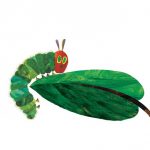
Here are three reasons why we love Eric Carle books!
1. Predictive Text
Predictive text builds confidence in young readers. In most of his early literacy books, the designated format repeats throughout the text and allows children to predict it. When young readers pick up on the pattern, you see the sparkle in their eyes. At first, they read along with you. Then, they use the pictures along with the pattern to feel like they are “reading”. This develops confidence right from the start. Be sure to point to each word as you read it to demonstrate one-to-one correspondence.
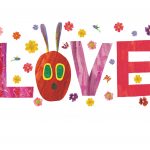
2. Life and Life Lessons
The Very Hungry Caterpillar is amazingly useful in so many ways. It creates a sensorial early literacy experience when children touch the holes on each page. When children engage their senses beyond listening during a literacy experience, they retain more knowledge. Any time that children are touching, feeling, and interacting with the text, is a win! Additionally, the very hungry caterpillar can be tied into many real-life topics and teachable moments such as the life cycle of a butterfly, eating healthy and the days of the week.
- The Grouchy Ladybug – teaches about manners and encouraging prosocial interaction to build connections with others in an appropriate way.
- Brown Bear, Brown Bear, What Do You See? is an all time classic that teaches children colours, and animal names in an abstract and imaginative way using unexpected colours like “purple cat” or “blue horse”
- Panda Bear, Panda Bear, What Do You See? and Polar Bear, Polar Bear, What Do You Hear? have the same predictable patterns. Panda Bear addresses endangered animals, which can be a great way to tie in social studies. You can identify where the animals in the book live on a map and talk about ways to help these animals by doing things like taking care of the environment.
3. The Illustrations are AMAZING!
Eric Carle’s art is distinctive and instantly recognizable. His artwork is created in collage technique, using hand-painted papers, which he cuts and layers to form bright and cheerful images. The brush strokes show texture and dimension and a signature creation that can only be connected to his unique style. A true work of art on every page!
These books inspired us to create our own book using his technique. Here’s what we did, and you can do this at home too!
- Paint an open-ended abstract picture.
- Ask the child to name their favorite animal.
- Cut out the painted picture into strips or shapes.
- Glue the pieces together in the shape of their favourite animal. They may need some assistance with this part.
- Add the text in the format “Child’s Name, Child’s Name, what do you see?
- Record the name of the animal and colour with the text. “I see a Colour Animal looking at me!”
- You can laminate the page and create more pages to make a book. Assemble the pages with a hole punch and binder ring.
Voila! You have your own homemade “Eric Carle” style book that your family will treasure! Our children love to make homemade books and keep going back to read them over and over again!
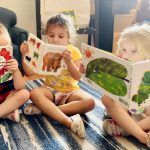
Take a look at our metamorphosis project video.
Early Childhood Educators – THE Most Important Job in the World
Early Childhood Educators – THE Most Important Job in the World
I was once told that being an Early Childhood Educator was THE most important job in the world. I must agree, especially after so many years of seeing the rewards of my hard work. The relationships and bonds you build with the children and families are long lasting and they create an impact for the family and the educator alike. These relationship are often what inspires educators to continue in their chosen field because they feel rewarded and valued. However, this a bold statement to some and not all agree..
It is widely known that Early Childhood Educators are often viewed as “babysitters” and their expertise and knowledge is often undervalued in society. As we engage with children during this pandemic reopening period, I want to remind educators how valuable they are not only to the children and families, but to society in general.
Our Early Childhood Educators put a lot of thought, effort, and genuine passion into their children’s education and well-being each day. This not only has a direct effect on the family but also impacts the economy as well. By simply having child care allows families to work and sustain themselves and their families. Statistics show that parents with a solid support system and quality child care consistently reflect higher levels of productivity in the workplace. During this pandemic, the issue of child care has become paramount as parents and government begin to realize how important it is to a well functioning economy. So perhaps maybe its not as bold of a statement after all?
Studies conducted by Dr. Fraser Mustard, who established the institute of human development, head-start programs and spearheaded the Ontario early years programs, have changed the world or at least changed a few minds. I was fortunate to be able to see him speak in 1999 and was profoundly moved by his research and body of work. Many of his studies helped gain the financial backing and convince government that early childhood intervention and education was crucial to the economy.
He conducted a study that followed two groups of children over a 27-year period. One group had early childhood interventions, parent supports and educational opportunities starting at birth. The other group had less opportunity, advantages, and resources such as early childhood education. This research indicated that the first group not only achieved higher levels of success in their academics, but showed to be in long term committed relationships, and were self sufficient with established careers in their adulthood. The second group showed lower levels of success across the board as well as having significant drains on the economy and social systems.
https://www.oasw.org/Public/SocialWorkNow/A_Bold_Answer_to_an_Unmet_Need_in_Child_Development.aspx
The 1999 statistics showed that for every dollar directed towards early childhood development resulted in nine dollars saved in tax dollars for public welfare, health care, rehabilitation, and correctional institutional costs.
As you can see, the benefits of the services provided by Early Childhood Educators far exceeds just meeting the basic needs of a child, these educators are changing the world, one child at a time!
For more information about our programs and services click here.

